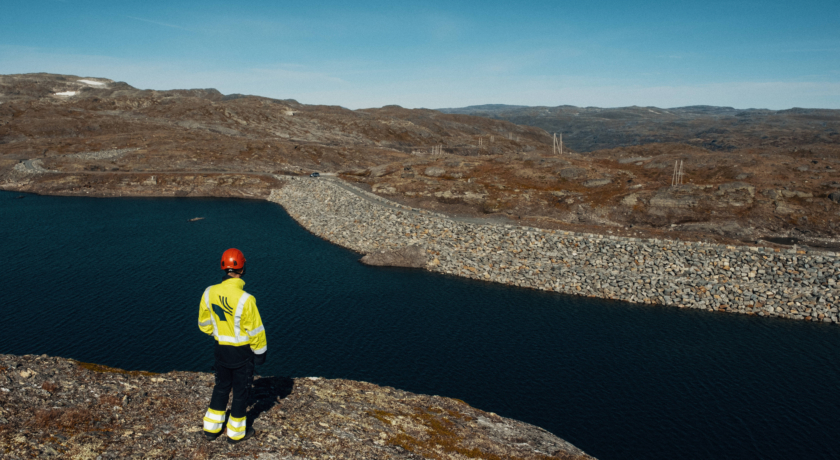Contribution to society and local value creation
Business strategy, business model and core values
Effective dialogue with landowners and local communities is crucial for Hafslund being able to contribute to society and local value creation. It is essential that there is close collaboration during the entire process in connection with developments and upgrades. Hafslund believes a proactive approach builds trust, enriches Hafslund’s projects and demonstrates the Group’s commitment to lasting and sustainable relationships with landowners and local communities.
Hafslund’s values (“Open”, “Responsible” and “Innovative”) describes who the Group is and who the Group wishes to be. They shall guide how the Group acts and have clear parallels to this material sustainability topic. Transparency is crucial for good dialogue with stakeholders, responsibility means giving something back and involving stakeholders, and innovation means that Hafslund wants to be better than yesterday, every day.
We have a clear presence in many local communities. Hafslund’s sponsorship activities are about giving something extra to the local communities in which Hafslund operates, beyond jobs and tax revenue.

Hafslund’s values (“Open”, “Responsible” and “Innovative”) describes who the Group is and who the Group wishes to be. They shall guide how the Group acts and have clear parallels to this material sustainability topic.
Impact, risks and opportunities
“Contribution to society and local value creation” is a topic that is to a large extent important due to the positive impact Hafslund has on people and the environment.
Every year, Hafslund supplies millions of inhabitants with clean, renewable energy that is produced by hydropower from Norwegian lakes and rivers, and excess energy from sources such as waste facilities. All of Hafslund’s profits go back to society, primarily in the form of tax revenue and dividends to the owner, the City of Oslo. Most of Hafslund’s power plants are owned together with the local municipalities, which receive valuable and predictable tax revenues from power generation. Hafslund is a large employer and provides many jobs across all of Southern Norway. Hafslund also wants to give something extra back to the local communities through sponsorships and local value creation.
Support from those affected by the group’s operations is crucial if Hafslund is to succeed in its strategic goals. Good dialogue is important to be able to develop more energy, as well as operate and maintain existing energy production. Therefore, the group has a close relationship with the local communities in which it operates and seeks a close dialogue with the local communities. In addition, efforts are made to use local service providers and partners in all contexts where possible. A short distance between the supplier and the plant means savings for the environment and local infrastructure, while at the same time securing local jobs.

Value creation for 2023 based on profit or loss figures
The diagram below distributes the amounts recognised in profit and loss, instead of the amounts paid discussed later in the sub-chapter. Here, the Hafslund Group’s results are calculated by taking the year’s recognised income (operating income, profit/loss from equity-accounted investees, realised and unrealised gains/losses on currency and interest income), and deducting energy purchases and transmission costs, as well as changes in the value of replacements.
Total value creation corresponds to NOK 18.7 billion.
Policy/Guidelines
Principles in the Group sustainability policy that are directly related to the important sustainability topic of contribution to “Society and local value creation”:
- Hafslund shall contribute to local value creation in areas where the Group operates.
- Large projects shall take local interests into consideration through strategic involvement, and it must be ensured that there is good dialogue with local communities and other stakeholders.
Hafslund has established guidelines related to the causes that the Group wishes to sponsor. These must be causes that directly or indirectly support the Group’s vision, values or strategic primary objectives.
- Teams and associations involved in sports, culture and outdoor activities in areas where Hafslund operates – Vestland, Akershus, Buskerud, Østfold, Innlandet and Oslo – and which, first and foremost, prioritise children and young people.
- Stakeholders and activities that focus on the environment and contribute to a more sustainable society.
- Stakeholders or associations that promote expertise, creative spirit and innovation at relevant and recognised educational institutions.
| Risks | Opportunities | |
|---|---|---|
| More difficult to develop more power | Local jobs | |
| Loss of reputation and political “goodwill” | Development of renewable energy | |
| More demanding to recruit employees | Initiatives in Hafslund’s nearby areas | |
| Local collaboration |
Actions
Metrics and targets
“Society and local value creation” is at topic for which it is difficult to set metrics and targets. Dialogue with local stakeholder groups is a continuous process and it is also not necessarily appropriate to have specific metrics and targets linked to this. Local procurement and local value creation are difficult to measure and will depend on the project.
Indicator table
- Contribution to society and local value creation
- Security of supply
- Driving force for renewable energy through good stakeholder dialogue
| Contribution to society and local value creation | Enhet | 2023 | 2022 | Comment |
|---|---|---|---|---|
| Value creation and distribution to host municipalities in the form of direct taxes and fees | NOK million | 508 | 447 | Natural resource tax and property tax. |
| Value creation and distribution to the Norwegian State in the form of direct taxes and fees | NOK million | 13,877 | 4,960 | Taxes, high-price contribution, employer's National Insurance contributions, licence fee, NOx tax, and incineration fee paid during the year. |
| Contributions to host municipalities/county authorities in the form of concessionary power benefit | NOK million | 605 | 1,549 | Concessionary power benefit. Estimate = Volume * (market price - concessionary power price) |
| Contributions to municipalities/county authorities in the form of licence fees | NOK million | 85 | 83 | |
| Total remuneration to employees* | NOK million | 935 | 669 | |
| Return to owner (City of Oslo) in the form of dividend | NOK million | 2,100 | 1,750 | Dividends paid |
*The comparison figure for total remuneration to employees has been updated. In case of an error, the reporting in 2022 contained employer’s tax.
| Security of supply, district heating | Unit | 2023 | 2022 | |
|---|---|---|---|---|
| Security of supply | Per cent | 99.97 | 99.97 |
| Driving force for renewable energy through good stakeholder dialogue | Unit | 2023 | 2022 | Comment |
|---|---|---|---|---|
| Hydropower’s reputation among the general public omdømme i befolkningen fjernvarme | Per cent | 88 | 89 | Precentage who answer that they are positive about hydropower in Kantar TNS climate barometer |
| Percentage of large hydropower projects that have been commenced which include stakeholder dialogue out of consideration to society, the public and the environment | Per cent | 90 | 95 |






